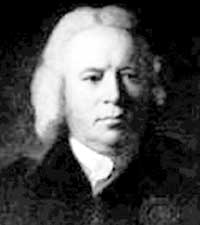Articles from the Thoroton Society Newsletter
Robert Dodsley: a Mansfield Lad Made Good

Robert Dodsley was born at Mansfeld on 13 February 1704. His father was Master of the Free School in Mansfeld.
Robert was apprenticed to a Stocking Weaver in the town but ran away from his Master and gained work as a footman in London. During this time he published a poem Servitude: a poem written by a Footman (1729) which had a preface and postscript attributed to Daniel Defoe and in 1732 a collection of short poems entitled The Muse in Livery: or, the Footman’s Miscellany which was published by subscription.
He became friends with people like Alexander Pope, who loaned him £100, and was able to establish himself as a publisher at the Tully’s Head in Pall Mall in 1735. He became one of the leading publishers of the period. One of his very early publications was Samuel Johnson’s London (1738), for which he paid ten guineas and he went on to publish many of Johnson’s works and suggested and backed Johnson’s Dictionary of the English Language. His patrons were comprised of many high ranking people.
Alexander Pope made over to Robert his interest in his letters but in 1738 Robert experienced a short imprisonment after publishing Paul Whitehead’s Manners, which the House of Lords voted as scandalous. In 1751 he published Gray’s Elegy.
There was a satirical farce, The Toy Shop, in 1735 in which the toymaker has moral comments on his wares, possibly infuenced by Thomas Randolph’s Conceited Pedlar.
Robert Dodsley founded several literary periodicals; The Museum (1746 – 1767), with three volumes; The Preceptor 1748, two volumes) which contained a general course of education with an introduction by Dr. Johnson; The World (1753-1756 in four volumes) and The Annual Register in 1758 with Edmund Burke as editor. Contributors to these works included Horace Walpole, Akenside, Soame Jenyns, Lord Lyttleton, Lord Chesterfeld and Edmund Burke.
Robert was probably best known as editor of two collections, A Select Collection of Old Plays (1744 in twelve volumes) and A Collection of Poems by Several Hands (1748 in three volumes). In 1745 he published a collection of his dramatic works together with some poems which had been separately issued, in one volume entitled Trifes, then came The Triumph of Peace, a Masque occasioned by the Treaty of Aix-en-Chapelle (1749), a long poem in blank verse,Public Virtue (1753), The Blind Beggar of Bethnal Green which was performed at Drury Lane in 1739 and issued in printed form in 1741, an ode Melpomme in 1751. The tragedy Cleone, had a long run at Drury Lane starting in 1758 with 2,000 copies being sold on the day the text was published with four editions being required within the year.
In 1759 he was able to retire and left the running of the business to his brother James who had worked with him for many years. During retirement he wrote The Select Fables of Aesop translated by R.D. (1764) and the Works of William Shenstone (three volumes 1764 -1769).
Robert Dodsley died on 23 September 1764 whilst visiting his friend Reverend Joseph Spence in Durham.
< Previous